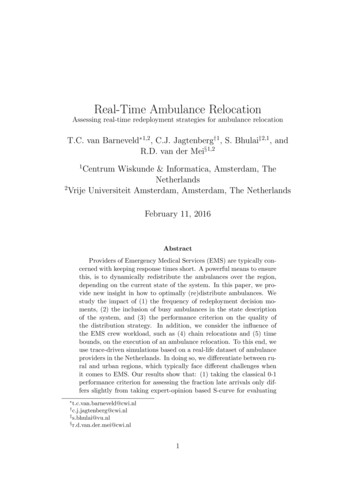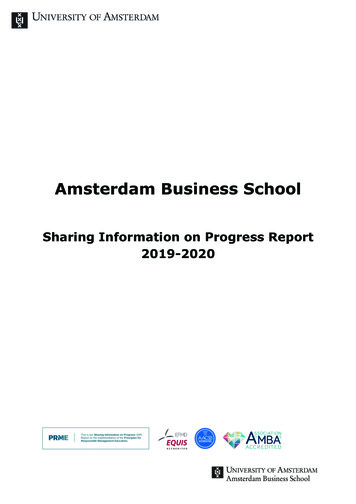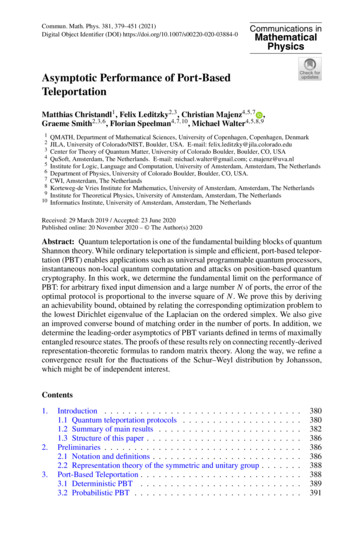
Transcription
RC21 AMSTERDAM CONFERENCE 2011 THE STRUGGLE TO BELONGDRAFT PROGRAMMEUpdate: 12-June 2011Sessions are numbered 1.1 etc. Round Tables are numbered RT1.1 etc.1. NEIGHBOURHOODS AND INDIVIDUALS: ADVANCED METHODOLOGIESSession Organizer: Karien Dekker1.1: QUANTITATIVE METHODS.Chair: Karien Dekker. Discussant: Tom van der Meer.Wouter van Gent & Sako Musterd (University of Amsterdam)Mobility patterns of first- and second-generation immigrant groups in Dutch urban regionsMariane C. Koslinski et. al. (Federal University of Rio de Janeiro - Regional and Urban Planning ResearchInstitute, State University of Rio de Janeiro)Socio-spatial processes and educational opportunities: a study of the effects of urban violence on school outcomein Rio de JaneiroSako Musterd, Galster, Andersson (University of Amsterdam)Temporal dimensions and the measurement of neighbourhood effectsEmily Miltenburg and Flip Lindo (University of Amsterdam)A different place for different people? Inequalities in the Effect of the Urban Neighbourhood on Residents‟Socioeconomic StatusRT1.1: VISUAL METHODS.Chair: Karien Dekker.Suvi Aho (Helsinki Metropolia University of Applied Sciences)Drama-based Methods in Urban SettingsKelum Palipane (University of Melbourne)Towards a Sensory Production of Urban Space: Developing a Conceptual Framework of Inquiry based on Sociosensory PerceptionHülya Mete (Mimar Sinan Fine Arts University – Istanbul)Expectation of ImmigrationAlicia Qiji (Hong Kong Polytechnic University)Migrant Community and Education for Migrant Children in BeijingRT1.2: MIXED METHODS.Chair: Karien Dekker.Aneta Piekut and Philip Rees (University of Leeds, School of Geography)Living with Difference: Mapping Diversity in Leeds and WarsawTom van der Meer (a), Jochem Tolsma (b) (a: University of Amsterdam, b: Radboud University, Nijmegen)Ethnic diversity and its supposed detrimental effect on social cohesion
Romana Xerez & Jaime Fonseca (Technical University of Lisbon, CAPP - Centre for Public Administration &Policies Lisbon)Mixing Methods in Urban Research: Exploring City and Community Social CapitalAte Poorthuis & Karin Pfeffer (University of Amsterdam)Exploring urban place: the potential, challenges and limitations of Volunteered Geographic InformationDISTRIBUTED PAPERSProf. Lucinda Fonseca, Dr. Jennifer McGarrigle (Centre of Geographical Studies, Institute of Geography andSpatial Planning, University of Lisbon) Dr. Agata Górny, Sabina Toruńczyk-Ruiz (Centre of Migration Research,Warsaw University)Social relations in multiethnic neighbourhoods: the role of neighbourhood and individual characteristicsEda Ünlü-Yücesoy (Istanbul Sehir University )Exploring Istanbul neighbourhoods; like and alikeAndjelka Mirkov (University of Belgrade)Challenge of Socio-Economic Diversity on the Neighbourhood Level in BelgradeJuliana Carvalho (Ryerson University, Canada)Humanitarian Fence: keeping problems away from “our” citiesMilica Milojevic (University of Belgrade)Neighbourhoods, individuals and inok: Conceptual distinctions on the terms of neighbourhood and community2. SOCIAL CONSEQUENCES OF GENTRIFICATIONOrganizer: Erik Snel2.1 SOCIAL CONSEQUENCES OF GENTRIFICATION.Chair: Justin Beaumont. Discussant: Jan RathJens Dangschat (Vienna University of Technology, Department of Spatial Development,Infrastructure andEnvironmental Planning)Neighbourhood Change between Gentrification and the Renaissance of DowntownErik Snel, Salome Aussen, Fense Berkhof and Quirine Renlo (Erasmus University Rotterdam)Views of gentrification from below: how Rotterdam local residents experience gentrification?Özgür Sari (Selçuk University, Dpt. of sociology)Social Consequences of Gentrification in Ankara: The Case of Çukurambar DistrictShinwon Kyung (a), Kwang-Joong Kim (b) (a: Urban Institute, Washington, b: Seoul National University)„State-facilitated Gentrification‟ in Seoul, South Korea: for Whom, by Whom and with What Result?RT2.1 SOCIAL CONSEQUENCES OF GENTRIFICATION.Chair: Erik Snel.Csaba Jelinek (Central European University, Budapest)Relocation and Displacement in the Case of Budapest: The Social Consequences of Gentrification in FerencvárosBahar Sakizlioglu (Utrecht University)A Comparative Look at Displacement Experiences: The Cases of Amsterdam and IstanbulPeter Kwong & Rui Mao (Colombia University, Shenzhen University)Manhattan Chinatown: Gentrification in a Neoliberal City
Georgia Alexandri (Harokopio University, Athens)The Breeder Feeder: Tracing Gentrification in Athens City CentreDISTRIBUTED PAPERSIlaria Casillo (CNRS, Lyon)"Italy: gentrification as urbanity‟s nostalgia. The social dynamics and spatial practices of gentrification. The caseof San Frediano neighbourhood in Florence."3. LOCAL RESPONSES TO TRANSNATIONALISMOrganizer: Margit Fauser & Gery Nijenhuis3.1: LOCAL GOVERNMENTS AND TRANSNATIONAL MIGRATION.Chair Margit Fauser. Discussant: Gery Nijenhuis (Bielefeldt University)Edith van Ewijk (University of Amsterdam)Learning about diversity through city-to-city partnerships; the case of Dutch-Moroccan & Dutch Turkish municipalpartnershipsMíriam Acebillo-Baqué, Irina Ciornei and Eva Østergaard-Nielsen (Department of Political Science/IGOP,Autonomous University of Barcelona)Local dynamics of codevelopment and migrant incorporation in four Catalan citiesAnna Lucia Colleo (Nomisma Società di studi economici, Bologna)Making transnationalism work for local development: the outcomes of a peer-review that involved local authoritiesAntonie Schmiz (Humboldt-Universität zu Berlin)Local Responses on Migrant Activities in BerlinRT3.1 TRANSNATIONAL NETWORKS, LOCAL LABOUR MARKETS AND URBAN CONFLICTS.Chair Gery Nijenhuis & Margit Fauser (Utrecht University)Lara Jüssen and Dr. Eva Youkhana (University of Bonn)Local Responses to Transnational Migration: Citizenship, Belonging and the Case of Latin American Migrants inMadridMaija Merimaa (University of Helsinki )Mind the Gap. The Labor Market Mobility of Highly Skilled Chinese and Indians in Helsinki RegionAdebusuyi Isaac Adeniran (Obafemi Awolowo University, Nigeria)Cross-border Networking and Identity Construction among Ejigbo-Nigerians in Abidjan, Cote d‟IvoireBarbara Tiefenbacher & Stefan Benedik (University of Graz)“Everything comes only for them” Differentiations as a result of transnational Romani migrations in a CentralEuropean example.DISTRIBUTED PAPERSTon van Naerssen (Radboud University Nijmegen)Transnational Synergy for Cooperation and Development (TRANSCODE). A learning experience.
4. THE END OF URBAN NEOLIBERALISM (AS WE KNEW IT)?Organizer: Ugo Rossi, Stijn Oosterlynck, Sara Gonzalez, Ramon Ribera Fumaz4.1 THE END OF URBAN NEOLIBERALISM (AS WE KNEW IT)?Chair: Ugo Rossi.Manuel B. Aalbers (University of Amsterdam)Cities and Countries in the Atlantic Heartland: Still Managed by the Markets?Sebastian Schipper (Goethe-University Frankfurt am Main)„Not the market has failed, but the state” – The hegemony of urban neoliberalism in the case of Frankfurt am Mainduring the crisis 2008-2010Nikos Souliotis & George Kandylis (Greek National Center for Social Research )The neoliberalization dynamics of urban policies in Athens before and after the IMF-EU-ECB stabilization programStijn Oosterlynck (a), Sara Gonzalez (b) (a: University of Antwerp, b: Leeds University)„Don‟t waste a crisis‟: opening up the city yet again for neoliberal experimentationRT4.1 THE END OF URBAN NEOLIBERALISM (AS WE KNEW IT)?Chair: Ugo Rossi.Nabil Kamel & David Pijawka (Arizona State University)The Nature of Post-Disaster Recovery and Neoliberal Politics of Assistance following Hurricane KatrinaAlberto Violante (a), Sandra Annunziata (b) (a: University “La Sapienza”, b: University of Roma Tre)Rome-Model: rising and fall of an hybrid neo-liberal paradigm in Southern EuropeRay Forrest (a), Yosuke Hirayama (b) (a: University of Bristol, b: Kobe University)Neoliberalism and the Reproduction of Home Ownership5. GOVERNANCE AND DIVERSITY IN CITIESOrganizers: Marisol García Marc Pradel5.1 GLOBALIZING FORCES AND LOCAL GOVERNANCE OF SOCIAL INCLUSION.Chair: Marisol Garcia. Discussant: Enzo Mingione.Sophie Body-Gendrot (Cesdip/CNRS and University of Paris-Sorbonne)Globalization and Urban Insecurity. Comparative perspectivesMiriam Schad (Institute for Advanced Study in the Humanities (KWI), Essen)Political inclusion and exclusion in a disadvantaged neighbourhoodMolefe Coper Joseph (University of Johannesburg)Beyond modernist planning: Understanding urban street vending in BotswanaRaphaella Dewantari Dwianto & Erna Ermawati Chotm (University of Indonesia)Space for informal sector in decentralization. Learning from two contrasting cities in Indonesia5.2 POLITICS AND POLICIES OF DIVERSITY.Chair: Marc Pradel. Discussant: Enzo Mingione.
Naaz Rashid (London School of Economics and Political Science)Recognising diversity in diversity: the importance of place in delivering national policy initiatives on empoweringMuslim women in the UKLinda Szabó (Central European University, Budapest)Governmental Policies on Chinese Migrants Urban Incorporation in BudapestHe Huang (University of Kent)Winner and Loser in Wuhan City Development: A Comparison of Two Unban VillagesRT5.1 GOVERNANCE AND PLANNING FOR INTEGRATING SOCIAL DIVERSITY.Chair: Marc Pradel. Discussant: Frank Moulaert.Lana Salman (American University of Beirut )Social Integration, or Spatial Segregation? Negotiating Technical Expertise in the Making of the Shemlan MasterPlan.Hector Rocha Isaias (Architecture and Urbanism, Fortaleza - UFC)The special zones of social interest and the possibility of inclusive urban regulations on Fortaleza MetropolitanRegionGhazala Aziz (Aligarh Muslim University, India)Migration and Changing Character of Cities in India - A Case Study of Selected Cities in North IndiaMatthias Fleischer(Friedrich--Alexander--Universität Erlangen--Nürnberg)„My food doesn‟t grow upon your policies‟ and alternative perspective in the urban agricultural policies underSouth African conditions of local governanceRT5.2 PUBLIC SPACE: GOVERNING DIVERSITY.Chair: Marisol Garcia. Discussant: Marc Martí Costa.Evelyne Baillergeau (CREMIS/University of Montreal)"Between public order and public health. The formal and informal management of „nuisance‟ involvingmarginalised groups in the urban public space."Penny Koutrolikou & Dimitra Siatitsa (National Technical University of Athens / University of Thessaly, Greece)The construction of a “public” discourse for Athens centre: media, migrants and inner-city regenerationMiriam Meissner (University of Amsterdam)"The Right to the Goutte d‟Or: Techniques of a Contemporary Urban Conflict and Limits to the Right to the CityIdeal"Katerina Mojanchevska (Programme Coordinator at Performing Arts Center Multimedia, Skopje, Macedonia)Challenges to Democratic Representation in the Public Space of Societies in Transition:case study of the city of Skopje6. MARKETPLACES AS SITES OF COSMOPOLITANISMOrganizers: Ching Lin PANG, Jan Rath Sophie Watson6.1 EMPIRICAL CASE STUDIES OF MARKETPLACES IN THE GLOBAL NORTH AND SOUTH.Chair: Jan Rath. Discussant: Ching Lin Pang.Halide Eroğul & Hıfsiye Pulhan (Girne American University, Eastern Mediterranean University, North Cyrpus)
Traditional Marketplaces as representatives of cultural geographies struggle to belong in 21th century: The Caseof Bandabulya in CyprusHsien-chi (Sunny) H. (Catholic University of Leuven, Belgium)Changing configurations in the Flea Market of BrusselsSara Sterling (Tsinghua University)Transactions and Transformations: Internal Migrant Women in Beijing‟s Silk Street MarketChristal Mudi-Okorodudu (University of Helsinki)Immigrant street traders in South Africa: the economics, the struggle and the tensions.Martha Radice (Dalhousie University, Dpt of Sociology )Cosmopolitanism in commercial streets in Montréal: Relations of the market, or just in the marketplace?RT6.1 THEORETICAL RUMINATIONS AND EXPLORATIONS ON MARKETPLACES ANDCOSMOPOLITANISM.Chair: Sophie WatsonSurajit Chakravarty (University of Southern California)Spaces of Market-culturalismValnei Pereira (Faculdade de Arquitetura e Urbanismo Brazil)Gentrification and cultural belonging in metropolis of global south: Producing scales of difference in São Paulo,BrazilVera Zambonelli (University of Hawai’i )Urban Scenes of Everyday Cosmopolitanism: Brazilian Restaurants in Tokyo, Japan7. ‘GATED COMMUNITIES’ FROM A GLOBAL PERSPECTIVEOrganizer: Philip Lawton7.1 ‘GATED COMMUNITIES’ FROM A GLOBAL PERSPECTIVE.Chair: Philip Lawton.Judit Bodnár (a), Virág Molnár (b) (a: Central European University, Budapest b: The New School for SocialResearch, New York)Are there gated communities in postsocialist Eastern Europe?Igal Charney and Michal Palgi (University of Haifa, Israel)„People like us‟: gatekeepers and the rise of community expansions in the neo-liberal kibbutzJacob R. Boersema (University of Amsterdam)Guilt behind the Gate: White South Africans & The Experience of Gated Living in post-apartheid South AfricaSandra da Costa, Gustavo Forlin, Mateus Godoi Maria, Rafael Lucio da Silva, Monique Bruna Silva Carmo(University of Vale do Paraiba, Brazil)Urban Sprawl and New Forms of Urbanization in Brazil: The Characteristics of Gated Communities in the Valleyof the Paraíba River, São Paulo StateRT7.1 ‘GATED COMMUNITIES’ FROM A GLOBAL PERSPECTIVE.Chair: Philip Lawton.
Berenice Bon (University of Paris Ouest Nanterre)Territories of new condominiums apartments, and their interaction within the city: the case of projects in Delhi,India.Manfred Spocter (Stellenbosch University, South Africa)"Non-metropolitan residential gated developments in the western cape province, South Africa"Lynda Cheshire & Rebecca Wickes (The University of Queensland, Australia)Orchestrating Cohesive Communities in Master Planned Estates: A Comparative Analysis of SuburbsMichael Bankole (Tai Solarin University of Education, Ijagun, Ogun State, Nigeria)Gated Neighbourhood and Crime Control in African Cities: Case of Ibadan, Nigeria.RT7.2 ‘GATED COMMUNITIES’ FROM A GLOBAL PERSPECTIVE.Chair: Philip Lawton.Sabine Meier (University of Amsterdam)'Arabian Kasbah' for sale in Rotterdam: The appeal of a themed and gated residential area for the urban middleclasses.Bruno Cousin & Sebastien Chauvin (University of Lille 1 / University of Amsterdam)The Truly Advantaged Insularity, multi-territorial belonging, and upper-class self-segregation in St. Barts (FWI)Zaire Z. Dinzey-Flores (Rutgers University, New York)„Green Veneers:‟ Home Edens, Cement Gardens, and Segregation in Puerto Rico‟s Gated Communities8. WORLD CITIESOrganizer: Michael Timberlake*8.1 WORLD CITIESChair: Michael Timberlake.Ben Derudder, Elien Van De Vijver, David Bassens, and Frank Witlox. (Ghent University, Belgium)Networks of world cities: an empirical analysis of global air travel connections in 2008.Peter J Taylor (a), Michael Hoyler (b), Kathy Pain (c), Sandra Vinciguerra (c) (a: University of Northumbria, b:Loughborough University, c: University of Reading)"Extensive and intensive globalizations: explicating the low connectivity puzzle of US cities using a city-dyadanalysis"Costanzo Ranci (Polytechnic of Milan – DiAP)Social cohesion and economic competitiveness in six global European citiesBen Derudder (a), Peter Taylor (b), Pengfei Ni (c), Anneleen De Vos (a), Michael Hoyler (b), Heidi Hanssens (a),David Bassens (a), Jin Huang (d), Frank Witlox, Wei Shen (e) and Xiaolan Yang (d). (a: Ghent University, b:University of Loughborough, c: Chinese Academy of Social Sciences, d: Beijing University of Post andTelecommunication, e: ESSCA École de Management)Pathways of Change: Shifting Connectivities in the World City Network, 2000-20088.2 WORLD CITIES.Chair: Michael Timberlake. Discussant: John Joe Schlichtmann, University of San Diego.
Beaverstock, Jonathan (University of Nottingham)The privileged world city: Private banking, wealth management and the bespoke servicing of the global super-richRoger Keil and Ute Lehrer (York University)World Cities – The Globalized SuburbBarbara Lipietz (London School of Economics and Political Sciences, UK)Bringing politics back in: World city formation in Johannesburg, South Africa'Giorgio Touburg (Erasmus University Rotterdam)Soft skills, tacit ties. Exploring the role of non‐geographical proximities in international knowledge transferRT8.1 WORLD CITIES.Chair: Michael Timberlake.J. Miguel Kanai (University of Miami)Manaus: the regional embeddedness of an Amazonian global cityValnei Pereira (Faculdade de Arquitetura e Urbanismo Brazil)Gentrification and cultural belonging in metropolis of global south: Producing scales of difference in São Paulo,BrazilTomáš Čížek (Charles University, Prague Institute of Sociology, Czech Academy of Sciences)Czech cities and globalizationAnna Mayr (TU Darmstadt, Germany)The global city discourse in urban transformations: A comparative view on Delhi and JohannesburgDISTRIBUTED PAPERSForum Dave (Sardar Patel Institute of Economical and Social Research)The Emerging Power House ---- A case study of Ahmedabad CityEugênio Ribeiro Silva (Federal do Rio Grande do Norte)World cities and strategies: A study shared between Natal and VancouverUlke Evrim Uysal (University of Helsinki)A Comparative Study on Tourism Promotion Strategies: The Case of Helsinki and Istanbul9. INVISIBLE MIGRANTS IN THE CITIES OF THE SOUTHOrganizer: Giovanna Marconi9.1 INVISIBLE MIGRANTS IN THE CITIES OF THE SOUTHChair: Giovanna Marconi. Discussants: Dr. Raquel Rolnik, UN Special Rapporteur on Adequate Housing.Prof. Marcello BalboHeidi Østbø Haugen (University of Oslo)African Pentecostal migrants in China: Urban marginality and alternative geographies of a mission theologyElena Ostanel (University IUAV of Venice)Citizenship in the making: Mozambicans in JohannesburgRafael da Silva Oliveira (a), Juan Miguel Kanai (b) (a: Federal University of Roraima, Brazil, b: University ofMiami)
Brazilian territories-networks in urban SurinameDenise Helena França Marques, Sonaly Cristina Rezende Borges de Lima (Federal University of MinasGerais/Brazil)How is the life of Latin American immigrants in Brazilian cities: one approach of the water supply and sanitationconditions in the beginning of XXI CenturyIranzu Gárriz Fernández (Universidad Autónoma de Zacatecas, México.)The Right to the City as a conceptual framework for studying the impact of North-South MigrationDISTRIBUTEDMirko Marzadro (University of Venice)Andean migrations processes. The case of the Peruvian of La Paz and El AltoRichard Grant (University of Witwatersrand, South Africa)The Great Escape”? Immigrant Entrepreneurs in Johannesburg and Soweto10. NEGOTIATING SOCIAL MIX IN GLOBAL CITIESOrganizers: Gary Bridge, Tim Butler10.1 NEGOTIATING SOCIAL MIX IN GLOBAL CITIESChair: Tim Butler. Discussant: Patrick le Gales.Sylvie Tissot (University of Strasbourg)Loving diversity/controlling diversity: the dynamic of inclusion and exclusion in American upper middle classculture.Stéphanie Vermeersch , Marie-Hélène Bacqué , Eric Charmes , Yankel Fijalkow, Lydie Launay (LAVUE)Constrained gentrification? A Paris case studyGeorge Morgan (University of Western Sydney)The Geography of Creative Aspiration: Class, Ethnicity and Mobility in a Global CityMartine August (University of Toronto)Negotiating social mix in Torontoʼs first public housing redevelopment: Community development, cohesion, andcriminalization in Don Mount Court/Rivertowne10.2 NEGOTIATING SOCIAL MIX IN GLOBAL CITIESChair: Gary Bridge. Discussant: Paul Watt.Talja Blokland & Julia Nast (Humboldt University Berlin)Truce, tectonics and the meanings of the passing-by: on the relevance of absent ties for understanding belongingin mixed neighbourhoodsMelissa Butcher (The Open University, Dpt. of Geography)Distinctly Delhi: Affect and Exclusion in a Crowded CityAnnick Germain (Institut national de la recherche scientifique)From social mix to ethnic mix? Montréal experience at the crossroadsEmma Jackson and Michaela Benson (King’s College London)„Not d
Özgür Sari (Selçuk University, Dpt. of sociology) Social Consequences of Gentrification in Ankara: The Case of Çukurambar District Shinwon Kyung (a), Kwang-Joong Kim (b) (a: Urban Institute, Washington, b: Seoul National University) „State-facilitated Gentrification‟ in Seoul, South Korea: for Whom, by Whom and with What Result?










